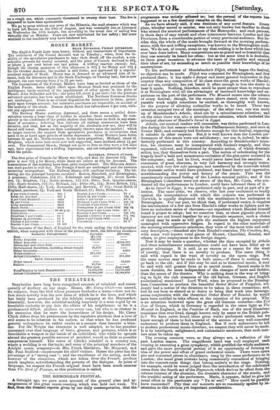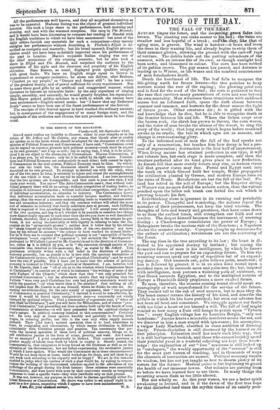THE BIRMINGHAM FESTIVAL.
A fortnight ago, we gave some account of the general plan and ar- rangements of this great music-meeting, which was held last week. We find, from the detailed reports given by our daily oontempccaries, that the
programme was strictly adhered to; but the perusal of the reports has suggested to us a few desultory remarks on the festival.
As we have already said, it was destitute of any novel feature. Every piece, whether sacred or secular, was not only known but familiar to those who attend the musical performances of the Metropolis; and such persons, in these days of easy transit and close intercourse between London and the Provinces, form a considerable portion of every provincial audience. But be- sides this the whole of the music brought forward at the morning perform- ances, with few and trifling exceptions, was known to the Birmingham audi- ence. We do not., of course, mean to say that nothing is to be done which has ever been done before. Many compositions are so grand and so beautiful that they can scarcely be heard too often; but at the same time it is desirable, on these great occasions, to advance the taste of the public and expand their ideas of art, by extending as much as possible their knowledge of its masterpieces. To the performance of Mendelssohn's Elijah, which began the festival, no objection can be made. Elijah was composed for Birmingham, and first produced there; it has made a deeper and more general impression in this country than any composition of its class since the great works of Handel; and no one, certainly, has yet heard it often enough to lose the desire to hear it again. Nothing, therefore, could be more proper than to reproduce it at Birmingham with all the advantages of increased knowledge and ex- perience on the part of the performers. The Messiah enters into the scheme of every festival; though, for the reason above stated, even this incom- parable work might sometimes be omitted, as thoroughly well known, for the purpose of allowing unfamiliar works to be beard. These two oratorios occupied two of the mornings: of the other two, one was made up of Mendelasolan's Athalie, eked out by a miscellaneous selection; and on the other there was also a miscellaneous selection, which inoluded the principal choruses of Hardel's Israel in Egypt.
Athalie, our musical readers will remember, was thrice performed in Lon- don during the last season—twice by the Philharmonic Society, and once at Exeter Hall; and certainly had freshness enough for this festival, supposing it suitable in other respects. But.it is well known that the London per- formances of this music were not satisfactory; nor can it, indeed, be satis- factorily performed in this country. According to blendelssohn's inten- tion, his choruses must be incorporated with Racine's tragedy, and thus separated, relieved, and illustrated by dramatic action, of which dramatic action too, they themselves form a part. The notion of substituting for the tragedy itself a bald and monotonous recitation of the plot never occurred to the composer; and, had he lived, would never have had his sanction. A succession of great choruses, iii very full harmony and strongly instru- mented, with very few solo passages, and unrelieved by the intervals which the dramatic action would have produced, was found heavy and oppressive, notwithstanding the power and beauty of the music. This was the unanimously expressed feeling of the London musical public; and if the Birmingham Committee were not aware of the fact, Mr. Costa, who con- ducted all the performances in London, could have informed them of it.
As to Israel in Egypt, it was performed only in part, and as part of a se- lection. The same critic, we observe, who last year exclaimed so loudly against the interpolations with which this oratorio was performed at Norwich, is equally displeased with the mutilations it has undergone at Birmingham. For our part, we think that, if performed entire, it requires the introduction of a few airs from Handers other works to lighten and re- lieve an unbroken series of choruses,—an expedient which Handel himself found it proper to adopt; but we conceive that, as these gigantic pieces of harmony are not bound together by any dramatic sequence, such a choice of them may be made as will give the audience the highest enjoyment unmingled with oppressive fatigue. In regard to the other materials of the morning miscellaneous selections, they were of the most trite and ordi- nary description,—detached airs from Murders oratorios, The Creation,
with some well-known vocal pieces of Mozart, Cherubini, Rossini, and others, to give employment to the foreign singers.
Now it may be made a question, whether the time occupied by Athalie and these miscellaneous commonplaces could not have been filled up to greater advantage. It is said, as an excuse or a reason for the want of novelty, that there is no novelty to produce. The same thing is said with regard to the want of novelty on the opera stage. But the same answer may be made in both cases,—if there is nothing new, go back to the old; and if this may be said as to theatrical music, it may be said with still greater force as to sacred music. Sacred music is far more durable, far more independent of the changes of taste and fashion, than the music of the theatre. Why is nothing done in the way of bring- ing to light the rich treasures of the old Italian, German, and English ecclesiastical musicians? Lord Ward, when he proposed to the Birming- ham Committee to produce the beautiful Stabat Mater of Pergolesi, evi- dently had a notion of the direction to be taken in these researches; and, had he not been so absurd as to desire to bring that work into heteroge- neous conjunction with the theatrical Stabat Mater of Rossini, he would have been. entitled to take offence at the rejection of his proposal. Why is no attention bestowed upon the great old German oratorios—the Tod Jesu of Grano, which in Germany is regarded in the same light as The Messiah in England, or the Passione of Bach, one of the most illustrious musicians that ever lived, though known only by name to the British pub- lic? We have never heard these great works performed entire, but we know enough of them to feel assured of the success of any well-executed endeavour to produce them in England. But if such endeavours be left to modern professional musio-directors we suspect they will never be made. It is by intelligent, enlightened, and enthusiastic amateurs, that such mat- ters must be taken up. The evening concerts were, as they always are, a reflection of the past London season. The magnificent band was well employed each evening in executing a great symphony, which gratified the whole audience, and gave the more provincial portion of it an opportunity of forming an idea of the power and effect of grand orchestral music. There were opeia airs and concerted pieces in abundance, sung by the same performers as in London; the usual great mistake being occasionally committed of bringing into the concert-room things that belong entirely to the stage. Nothing, for example, could be worse judged than the introduction of the celebrated scene from the fourth act of the Huguenots, which derives its effect from the intense interest of the situation, the dramatic character of the music, and- the truthful acting of the performers. Mario, it appears, failed to give his usual effect to the passionate cry " Tu m' anal!" How could he possibly have succeeded? Pity that our concerts are so constantly spoiled by in- attention to this obvious yet important consideration. All the performers are well known, and they all acquitted themselves as was to be expected. Madame Sontag was the object of greatest individual interest. She took a large share in the performances, both morning and evening, and met with the warmest reception. She sang in The Messiah; and it would have been interesting to compare her reading of Handel with the English traditions to which we have been accustomed: but none of the daily critics furnish any materials for such a comparison—they merely eulogize her performance without describing it. Pischek's Elijah is de- scribed as energetic and masterly; but his broad uncouth English pronun- ciation could not have been materially improved since his performance of the part in London. Mario's exquisite Italian singing was one of the chief attractions of the evening concerts; but he also took a share in Elijah and The Messiah, and surprised the audience by the expression of his style and the clearness and propriety of his English elocution. Sims Reeves, as usual, displayed great qualities mingled with great faults. We have no English singer equal to Reeves in impassioned or energetic recitative; he alone can deliver, after Braham, "Comfort ye my people," or "Deeper and deeper still": he has a voice of the greatest beauty, and of power sufficient for every requirement. But he mars these good gifts by an artificial and exaggerated manner, which threatens to become an incurable habit: by the easy expedient of singing simply, smoothly, and naturally, he would greatly heighten his reputation. Miss Hayes gained golden opinions in a walk to which she cannot have been accustomed—English sacred music: her "I know that my Redeemer liveth" seems to have been one of the finest performances of the festival.
The receipts of this festival appear to have reached the ordinary amount; but, in consequence of the engagement of so many foreign stars, and the magnitude of the orchestra and chorus, the nett proceeds must be less than usual.



























 Previous page
Previous page